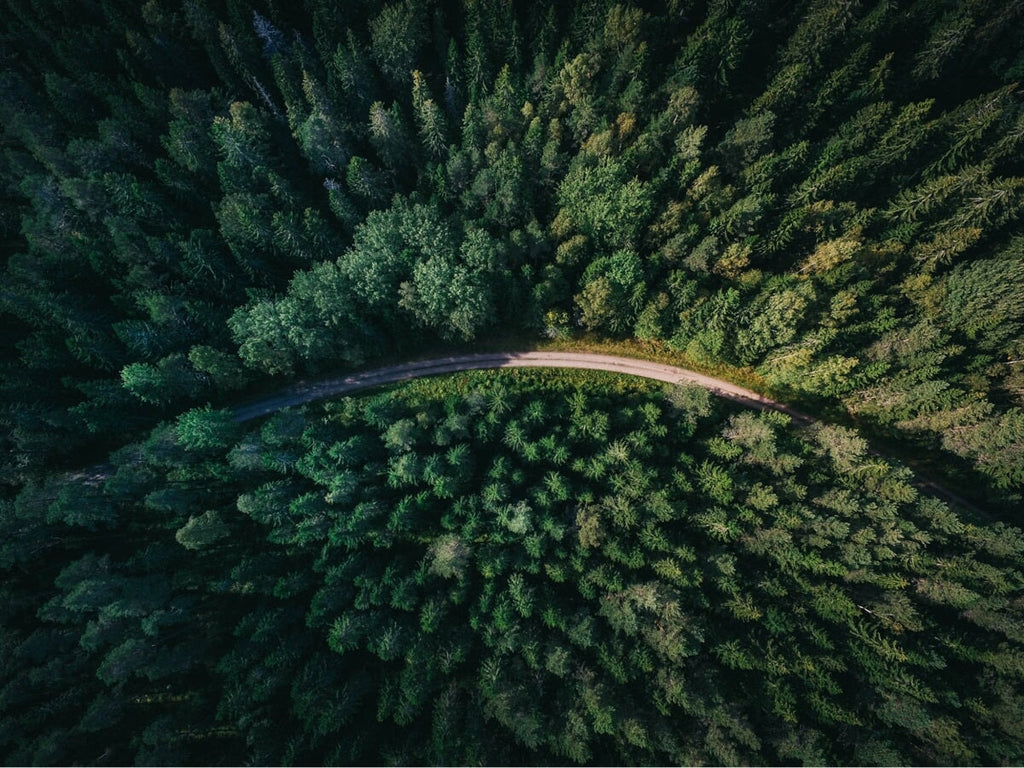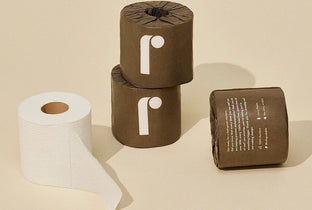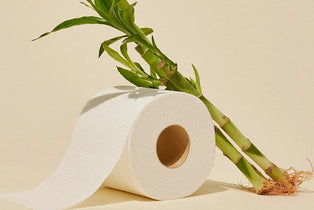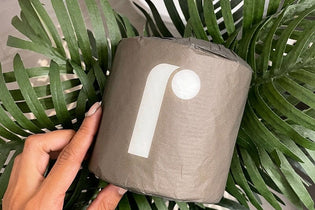
TLDR
Did you know that every year, an estimated 27,000 trees are felled each day just to produce toilet paper, according to National Geographic?¹ That staggering statistic translates to a jaw-dropping 9.8 million trees lost annually for our basic bathroom needs. As we continue to deplete our planet's precious forestry resources, it's time to ask ourselves – is there a more sustainable way?
Toilet Paper Industry’s Hidden Cost
The toilet tissue industry is a tree-hungry beast. While traditional toilet paper may seem like a humble household product, its environmental impact and carbon footprint are anything but small.² Each careless flush carries with it a hidden cost – the loss of another ancient tree that took decades, even centuries, to reach maturity.
Opting for paper products made with more sustainable practices — like recycled paper towels or bamboo toilet paper – can make a big difference over time. Learning more about small differences in these daily household materials, like paper towels vs. cloth towels, may surprise you with the impact you can have.
Bamboo Toilet Paper: A Sustainable Alternative
But fear not, eco-warriors! There's a new kid on the block, and it's here to shake up the toilet paper game. Introducing Reel Paper's bamboo toilet paper, nature's answer to our bathroom woes. This tree-free, FSC-certified product is made from highly renewable bamboo that can be harvested without clearing forests or damaging ecosystems. It's also biodegradable, plastic-free, BPA-free, fragrance-free, chlorine-free, and free from inks and dyes.
We get it – using bamboo on your sensitive areas may prompt some questions, like “Can bamboo toilet paper cause irritation?” Or, “Is it strong enough to get the job done?” At Reel Paper, we’re here to help with all of these questions and show you the benefits of using these sustainable options for your personal hygiene (and the planet).
Bamboo is a true environmental champion, growing at a rate that puts other plants to shame. Some types of bamboo can shoot up an astonishing three feet in just 24 hours!³ This rapid regeneration means that bamboo can be cultivated and harvested sustainably, without the need for the destructive practices required in regular toilet paper production.
Environmental Concerns Stemming from Cutting Down Trees
Deforestation
Deforestation is a genuine threat to our planet's health. Every time a tree is felled, it's not just the tree that suffers; countless creatures lose their homes, and the intricate web of biodiversity frays a little more. The consequences of unchecked deforestation ripple outwards, disrupting entire ecosystems and contributing to soil erosion and climate change.⁴
Imagine a once-thriving rainforest in South America, teeming with life and biodiversity. Now, envision that same forest stripped bare, its canopy torn asunder, and its inhabitants displaced or worse. This is the grim reality that unfolds when we prioritize short-term gains over long-term sustainability. Learn about how to stop deforestation in our blog.
Climate Change
Trees are the Earth's lungs, inhaling carbon dioxide and exhaling life-giving oxygen. When we cut them down, we rob our planet of these vital carbon sinks, exacerbating the greenhouse effect and accelerating climate change. The loss of these leafy giants – paired with growing piles of paper waste – not only impacts the local environment but also contributes to global warming, threatening the very future of our species.
Just as a single cough can disrupt the rhythm of breathing,the loss of a single tree disrupts the delicate balance of our planet's atmosphere. As more and more trees disappear, the Earth's ability to regulate its temperature and weather patterns becomes increasingly compromised, paving the way for more frequent and severe natural disasters.
One way to play our part in renewing the environment is the simple practice of composting. If you’re new to this, it’s normal to have questions like “Can you compost paper towels or even toilet paper?” Taking the time to educate yourself on these small practices can be a rewarding way to care for the environment.
Erosion
Without the anchoring roots of trees, soil becomes vulnerable to erosion by wind and water. This leads to the degradation of once-fertile land, making it increasingly difficult for new vegetation to take root. Erosion can also clog waterways, disrupt aquatic habitats, and contribute to flooding and landslides – a chain reaction of environmental devastation.⁵
Picture a once-lush hillside, its slopes blanketed in a verdant tapestry of trees and foliage. Now, imagine that same hillside stripped bare, its exposed soil helpless against the relentless onslaught of wind and rain. This is the stark reality of erosion, a silent yet potent force that can render entire landscapes barren and inhospitable.
Social Impact
The consequences of deforestation extend far beyond the realm of nature. Indigenous communities, who have lived in harmony with the forests for generations, often bear the brunt of these environmental changes. Their traditional way of life is threatened, their sources of food and medicine dwindle, and their cultural heritage is put at risk.
Imagine a tribe whose very identity is woven into the fabric of the forest, their ancestry intertwined with the ancient trees that have sheltered them for centuries. As their verdant home disappears, so too does their way of life, their traditions, and their connection to the land that has sustained them for generations⁶.
Reel Bamboo Toilet Paper: Making an Impact with Every Flush
Reel Paper's commitment to sustainability goes beyond just our bamboo toilet paper. We are on a mission to revolutionize the way we think about everyday household paper products, proving that eco-friendly doesn't have to mean sacrificing quality or convenience. From eco-friendly paper towels to recycled facial tissues, Reel Paper is paving the way for a greener, more responsible future.
The next time you reach for a roll of toilet paper, pause and consider the impact of your choice. By opting for Reel Paper's bamboo toilet paper, you're not just treating yourself – you're treating the planet with the respect it deserves. Join the ranks of eco-warriors who are committed to leaving a greener, healthier world for generations to come.
Sources:
- Geographic, N. (2013, August 30). Friday fact: People flush about 27,000 trees’ worth of toilet paper down the drain every day. Twitter. https://twitter.com/NatGeo/status/373582748524761088
- Skene, J. (2020, June 24). Toilet paper is driving the climate crisis with every flush. Be a Force for the Future. https://www.nrdc.org/bio/jennifer-skene/toilet-paper-driving-climate-crisis-every-flush
- One Tree Planted. (n.d.). 8 amazing bamboo facts. https://onetreeplanted.org/blogs/stories/bamboo#:~:text=1.,or%2C%201.5%20inches%2Fhr.
- Canada under-reporting deforestation and carbon impacts by Forestry. CPAWS Wildlands League. (n.d.). https://wildlandsleague.org/news/ontario-deforestation/
- World Wildlife Fund. (n.d.). What is erosion? effects of soil erosion and land degradation. WWF. https://www.worldwildlife.org/threats/soil-erosion-and-degradation#:~:text=Deforestation,can%20actually%20worsen%20soil%20erosion.
- Social impacts. SPOTT.org. (2018, December 18). https://www.spott.org/palm-oil-resource-archive/impacts/social/





0 comments